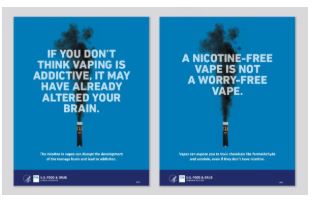News & Views: CDRH women health plan, ASCA, ALS guidance, Patient engagement, Limited Imodium packaging, Improving naloxone access, Premarket Tobacco Product Applications, Project Orbis

CDRH: Health of Women Strategic Plan
- Explores unique issues related to the performance of medical devices in women
- Improves analysis and communication of sex- and gender-specific data to better assure the safe and effective use of medical devices
- Develops and implements health science programs, strategies and initiatives focused on women’s health issues across CDRH

The Accreditation Scheme for Conformity Assessment (ASCA): Pilot Program
Under ASCA Pilot’s conformity assessment scheme, recognized accreditation bodies accredit testing laboratories for the competence of testing and calibration laboratories
- ASCA-accredited testing laboratories may determine conformance of device with eligible standards
- Provide declaration of conformity to support premarket submission
Scope
- Development of the ASCA pilot
- Conformity assessment resources leveraged in ASCA Pilot
- Roles and Responsibilities: Accreditation bodies, Testing laboratories, Manufacturers, FDA staff
- Selected Device Standards
- Accreditation body and Testing Laboratory Participation

Amyotrophic Lateral Sclerosis Guidance
ALS is progressive neurodegenerative disease that primarily affects motor neurons in cerebral motor cortex, brainstem, spinal cord, leading to loss of voluntary movement
- Guidance focuses on specific clinical drug development and trial design issues that are unique to the study of ALS
Considerations
- Early Phase Clinical Development, Population, Effectiveness and Safety Considerations.
- Specific Effectiveness Trial : Trial design, effectiveness endpoints, timing of assessments, statistical considerations., prognostic factors, integrated assessment of function and survival, Accelerated Approval considerations, Benefit-Risk considerations.

Patient Engagement in the Design and Conduct of Medical Device Clinical Investigations
FDA values experience and perspectives of patients and their family caregivers. Draft guidance scope:
- Use patient engagement to elicit experience, perspectives from patient advisors to improve design and conduct of medical device clinical investigations
- Benefits of engaging with patient advisors
- Patient engagement activities not considered by FDA to constitute research
- Collecting and submitting patient engagement information

Limited packaging for loperamide (Imodium) to encourage safe use
Reports of serious heart problems and deaths with much higher than the recommended doses of loperamide
- Primarily among people intentionally misusing or abusing the product
To foster safe use of the over-the counter (OTC) anti-diarrhea drug loperamide
- Use blister packs or other single dose packaging and to limit the number of doses in a package

Continued efforts to increase availability of all forms of naloxone to help reduce opioid overdose deaths
Addressing opioid overdose continues to be one of the most urgent public health priorities
- Naloxone is a critical tool for individuals, families, first responders and communities to help reduce opioid overdose deaths
- Three FDA-approved forms of naloxone – injectable, auto-injector and nasal spray – require a prescription, which can be a barrier
Steps to improve access to naloxone (Narcan)
- Pharmacists given direct authority to prescribe and sell naloxone to consumers
- Community distribution and use by individuals with or without medical training
- Approveal of first generic version of Narcan
- Encouraging development of OTC naloxone products.

Proposed rule for premarket tobacco product applications as part of commitment to continuing strong oversight of e-cigarettes and other tobacco products
Premarket tobacco product applications (PMTAs) for oversight of e-cigarettes and other tobacco products. Provide sufficient information on
- Physical aspects of a tobacco product
- Potential public health benefits and harms
- Also review tobacco product’s components, ingredients, additives, constituents, toxicological profile and health impact, as well as how the product is manufactured, packaged and labeled
- Establish requirements for manufacturers to maintain records related to the legal marketing status of their tobacco products

FDA takes first action under new international collaboration with Australia and Canada designed to provide a framework for concurrent review of cancer therapies
Project Orbis, an initiative of the FDA Oncology Center of Excellence (OCE), provides framework for concurrent submission and review of oncology products among international partners
- May allow cancer patients receive earlier access to drkugs
- Greater uniformity of new global standards of treatment leading to the optimal design of global clinical trials
First Project Orbis action in conjunction with the Australian Therapeutic Goods Administration and Health Canada
- Accelerated approval to Lenvima (lenvatinib) in combination with Keytruda (pembrolizumab) for treatment of advanced endometrial carcinoma
- Also used ‘Real-Time Oncology Review’ (RTOR) pilot program, which can streamline the submission of data prior to the completion and submission of the entire clinical application
Image credits: FDA, CDC